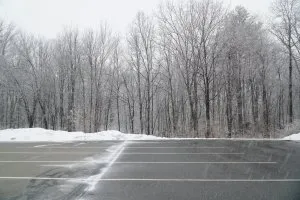
PREVENTING WINTER ASPHALT DAMAGE
Winter elements like the dreaded ice, snow, and sleet along with cold temperatures of the season can do a great deal of damage to asphalt. Therefore, it’s important to prepare ahead of time to prevent this type of damage, ideally creating a year-long maintenance schedule that will ensure your asphalt stays in the best condition possible throughout the year.
Understand How Damage Happens
The first step towards preventing winter damage is to understand how it happens in the first place. When snow melts on asphalt, it results in standing water which can seep into the asphalt causing it to become unstable. Freezing temperatures also cause any water left on the surface to settle into cracks, freeze, and expand. This cycle of freezing and thawing creates potholes, cracks, and other imperfections. The salt and plows that keep roadways safe also cause a great deal of wear and tear on asphalt.
Preventative Maintenance Clean The Surface
No matter what type of winter weather you are preparing for, even if it’s just cold temperatures, one of the most important maintenance tips to remember is to remove debris as quickly as possible. As a general rule, the longer any debris sits on the surface of your driveway, the more damage it can cause. Even organic matter like mud, grass, and leaves can cause damage if left on the surface. Therefore, perhaps the single most important way to take care of your asphalt is simply keeping it clear of debris.
Repair Cracks
Repairing cracks in your asphalt paving in Elkins Park, PA and surrounding areas is an important part of regular maintenance. It’s ideal to have cracks sealed during the summer as winter could cause these cracks to worsen. Cracks that are ignored will gather debris and water and cause even more internal damage. This will cause the area to expand, and then you will eventually have a pothole or a much larger crack to fix.
Be Mindful of Your De-Icing Method
For virtually all property owners with asphalt paving in Northeast Philadelphia or other nearby neighborhoods and towns, de-icing is a big issue in the winter months. You want to create some type of traction on your slick driveway, but some store brands contain a type of chemical that can cause damage to your asphalt pavement. Rock salt, or sodium chloride, which is a common method to de-ice, can cause deterioration in asphalt. Thankfully, calcium chloride is a much safer de-icing product for your asphalt driveway that won’t cause damage.
Address Snow Accumulation Promptly
Another important aspect of asphalt maintenance in the winter is addressing the issue of snow accumulation. If snow is allowed to pile up, not only will it make it harder to use your driveway, but it will also damage the asphalt underneath. You need to remove the snow, but without damaging the surface of your driveway. Generally, avoid using sharp metal objects to clear your drive. Instead, opt for a plastic shovel or a heavy-duty snow plow, or hire a professional to safely clean your driveway.
Seal Your Asphalt Driveway
While this isn’t something you want to do in the throes of winter, it’s a good idea to seal coat your asphalt driveway every two or three years. This adds another layer of protection against all sorts of damage. It can lengthen the lifespan of your asphalt and help you get more longevity from your investment. Sealing has to be done in warmer temperatures so that the barrier can fully cure.
Contact us Today
Contact us at Local Paving & Concrete for all your paving and maintenance needs. Let us help you get the most out of your driveway and ensure that it is well-maintained before and throughout the harsh winter season.